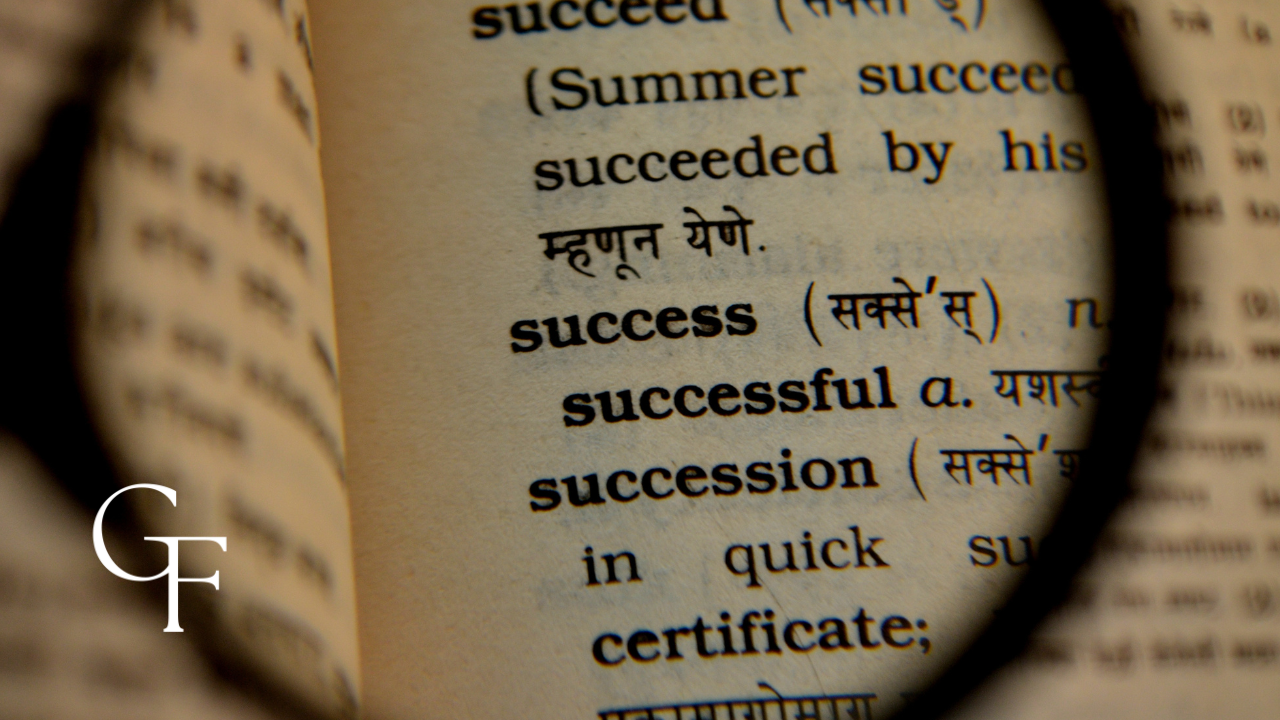
Define "Success"
Google AI suggests that success is "achieving your goals and living a life that aligns with your personal values. Success in life is subjective and varies depending on what is important to each individual. It's not just about wealth or fame; it's more about a sense of fulfillment and accomplishment in the areas you prioritize: career, relationships, personal growth, community impact, social skills, etc."
Perhaps many of you reading this would agree with that conclusion. After all, it sounds reasonable and logical enough, right?
"Fulfillment."
That sounds appealing. I can't recall meeting anyone who didn't want to be fulfilled, satisfied, or content in life.
Going Deeper...

Perhaps more than any other article, I've started and stopped this one the most. Just saying the title "How to Be Successful in Life" feels overwhelming.
Where to even begin?
How can I possibly keep this at a reasonable word count?
How can I offer something compelling, authentic, and valuable?
I guess the best approach to tackling such a dense and vital topic is honesty. After all, a sage man once said, "The truth will set you free." He was (and still is) correct.
This post will be a little different. Instead of directly telling you what I think (as is typical), I will present seven lies that modern Western society has perpetuated for several years (some longer than others).
Much of this so-called "advice" will sound familiar to you because it has become so prevalent and enticing that most books on personal development now contain it.
The (in)Famous "Growth Mindset"
The rise of the "self-help" movement has been largely predicated on the idea of a "growth mindset." I want to be very clear with my words here, so mark well and listen carefully.
Growth is good.
A positive mindset is also good.
Bettering the self is good as well.
But not all growth is good.
Cancer often grows, which is obviously counterproductive to human health and flourishing.
The same can be said for human beings. If we are growing towards something destructive or evil, most will agree that this "negative growth" (or regression, if you like) is unfavorable.
Oftentimes, growing toward something good and righteous is perceived as positive.
I think we can all agree that positive growth is key to a good, lasting, and righteous sense of fulfillment or satisfaction. However, before using that sort of language with such certainty, we must first define what makes something "good" to begin with.
You might be laughing a bit because much of this seems obvious, but I must set the stage here because the question is worth pursuing:
What makes a good deed righteous? Who defines such a thing? Who holds the ultimate authority for it? How do we "get to right" and abstain from "wrongful" behavior?
If we are to believe that genuine success is rooted in goodness and righteousness, and we desire to be fulfilled and satisfied by such things, then we must be willing to take an honest look at the world around us and carefully consider the life we are leading...
...because the life we live in is the life we live out.
What Achieving Success Ought to Look Like
I know that heading serves as a bold claim, but stick with me.
Positive growth of any kind is only good when we are in touch with objective truth, and truth is tied to reality.
What follows are seven lies (and trust me, there are many more), but these are perhaps some of the most common that we hear about today.
After each lie, I offer seven truths that clarify why the lies we often hear from the so-called "self-help" movement are not enough to fill the God-sized hole in our hearts.
Lie #1: "Do What Makes You Happy"
If I had a penny for every time I heard this, my wife and I could probably retire early. I think you know what I'm about to say. If what makes us happy involves doing wicked things, then that is, of course, wrong.
It's clear to me that when this advice is offered, it often suggests chasing what makes us happy as long as it's "socially acceptable." However, that remains a falsehood that never leads to a genuinely successful (or fulfilling) life, and here's why.
What humans naturally desire is not always good (in fact, it rarely ever is).
As a member of the human race, I am no different from any other human who walks this earth, born with a predisposition to sin.
In other words, I was born broken because mankind has been burdened by sin since the first man fell in the Garden of Eden long ago.
The first man and woman on this earth did what made them happy in the moment and believed a great lie told by the enemy and author of suffering in our world.
In doing so, they unleashed sin upon a world that wasn't just good but very good. This then broke the created order of what God intended so harshly that we humans must toil in a world plagued by death, illness, disease, and suffering.
Our ancestors were deceived by a great liar who whispered falsehoods in their ears and twisted the truth. Before they realized it, it was too late.
Choosing God's way leads to love, wisdom, and eventual flourishing (either in this life or the next). More importantly, it leads to union with God and eternal life.
However, choosing our own path, apart from God, inevitably results in destruction and death. If you believe I'm exaggerating, reconsider. It might seem overly "religious" or far-fetched, but pay close attention to the world around you; soon enough, you will see.
Living God's way means embracing the capital "T" Truth because it involves doing what is right.
Truth #1: Do What's Right
We can believe that no God exists, but we must establish a standard for goodness beyond a "gut" feeling. Personally, I find it impossible to discuss morality without bringing up God.
The Nazis probably "felt" that what they were doing to the Jewish people in Europe was good (for themselves) at the time, and yet we now look back on those terrible atrocities and recognize that those acts were vile and pernicious.
Likewise, many people, especially those claiming to be "religious" in the American South, once believed it was acceptable to enslave an entire group based on their skin color and cultural differences.
It took far too long for the authentic teachings of Christ to break through and eventually abolish slavery in the West for good, but it happened because there is no denying what is true: that all men and women are created equal and in the image of the almighty Creator.
The point is that humans cannot trust themselves to be the authority on what is good in our world. If we rely on our own understanding of how to live, we cannot truly succeed in an entirely honest and righteous manner.
We need something more.
Lie #2: "Pay Yourself First"
Here is some advice that many wealthy individuals frequently share. I heard it time and again in business school.
Yes, this philosophy can (and most likely will) help you accumulate a lot of wealth, but that assumes you view monetary wealth as your benchmark for success.
So, my question to you, friend, is, what are you aiming at?
How much is enough?
Why do you desire any specific amount of money? (Assuming that you do).
Now, I'm not trying to dictate what anyone should or shouldn't do with their money or how much to have. Ultimately, that is your prerogative, and I am not suggesting that having money is evil.
We all know that money is the dividing line between the "haves" and the "have-nots," which makes it highly desirable. After all, no one wants a challenging life if they are willing to work hard for an easier one. I don't disagree with this at all.
I like money, too—very much, in fact. I appreciate that it can fund nice trips to Europe with my wife and help my family eat, live well, and remain comfortable. It certainly comes in handy when life takes an unexpected turn and disaster strikes.
However, money can quickly become an idol.
Like many things in life, the initial intentions behind having something like money can be good. Providing for our loved ones, persevering through adversity, and maximizing our monetary potential can be noble if our hearts are correctly calibrated.
However, we risk becoming self-serving individuals when we fail to orient our hearts toward righteousness, love, and generosity. And that's detrimental to ourselves, the people we love, and the world at large.
Instead, I would like to suggest an alternative approach...
Truth #2: Give Away Your Money First
Would you believe me if I told you that giving away your money through tithing could help you become wealthier in your lifetime? It's true, though perhaps not only monetary wealth.
I want to clarify that I'm not suggesting we give to receive something in return; far from it. The Bible tells us that God loves a cheerful giver because He is after our hearts.
On a smaller scale, tithing requires us to know our numbers, including how much we earn, how much we need to earn, and how much we can spare. This can potentially grow our monetary wealth because we must closely account for what we make.
However, and more importantly, tithing can enhance our spiritual wealth on a much larger scale. In my opinion, there is no greater wealth than this. With a heart oriented toward Christ, our desire to give generously and our capacity to love, nurture, and seek the author of goodness, love, and truth will grow.
That is priceless.
Look at some of the wealthiest people on earth. Many of them are so miserable—it's tragic. Frequently, more money only leads to more problems because no amount of spending can satisfy an insatiable appetite for more, more, more...
The truth is, we would be better off giving our money away entirely than using it to buy anything and everything to satisfy our cravings.
Lie #3: "Live Your Truth"
You've probably heard this multiple times in recent years. In a culture focused on personal and professional growth, many individuals embrace this concept because it positions them as the heroes of their own stories.
I understand; very few want to see themselves as the villains in life. We're all caught up in the endless struggle to think and feel "positively" about ourselves. However, in doing so, we often distort reality by believing what is most convenient for us at critical moments.
What's most tragic is that shame has become such a monstrous force in our world that it drives us to present a highly edited version of ourselves to hide who we truly are. Shame often compels us to convince ourselves and others that we are someone we are not as we grapple with accepting the brokenness we can feel deep in our souls.
We often retreat to online platforms, virtually fabricated worlds, and endless comment sections that act as echo chambers meant to validate our personal narratives—that we are strong, powerful, righteous, and courageous—all in the hope of believing the same lie whispered in the ears of our ancestors: that we are enough...
Truth #3: Seek The Truth
But the truth is that we are flawed, broken, unrighteous, guilty, weak, insufficient, and in desperate need of saving.
God knew that we could not measure up to His standards of righteousness and goodness and was wracked with grief after seeing the good world He had made crumble under the weight of sin and suffering.
God then enters into suffering through Jesus and suddenly establishes a meaning that makes our suffering sufferable. Jesus knew that we didn't need healing but instead a healer, so He stepped in to satisfy God's wrath by dying at the hands of a guilty people... for those people, redeeming us all.
The idea that "self-love" is a necessary milestone for a successful life can be destructive and misleading.
Phrases like "Live your truth," "Tell your truth," and "Trust in yourself" are becoming increasingly common in modern culture, but these platitudes ultimately lead to nowhere.
I have realized that the truth is far more profound and beautiful than this lie would suggest.
I, you, and the characters in our favorite movies and shows are not enough. Our friends and family aren't enough, nor are those who fight wars or cure illnesses, nor are the impoverished or oppressed.
No one on this earth is enough because only Jesus is enough. Jesus is the way, the truth, and the life, sent by God, His Heavenly Father, to be the healer of a broken world.
The truth is that we must shape our perspective on life through the lens of Jesus. It is the only hope for being truly good and achieving success in life.
Lie #4: "Build Your Legacy"
For much of my life, I measured my worth by what I aspired to do and the legacy I hoped to leave behind.
We humans are amusing, aren't we? We care deeply about how the world will remember us, yet we neglect what awaits us beyond life on earth.
We get caught up in our earthly concerns and pay less attention to our ultimate destination.
We chase after temporary solutions to eternal problems.
We care so much about "achievement" that we will work ourselves to death for it.
I've encountered many individuals who encourage future generations to consider their legacy and make choices based on the person they aspire to be. The concept of what our lives could evolve into and how the world may remember us for something meaningful or transformative is captivating.
After all, who wouldn't want to be celebrated?
Besides, our legacy is essential, right? It's what we leave behind for those who come after us... Wrong.
Truth #4: Focus On the Legacy of Christ
We are all just a few generations away from being completely forgotten, and that’s a sobering reality to acknowledge.
The Gospel message reminds us all that we are woefully unimpressive, but despite that fact, the God of the Universe not only chose to love us from our very first heartbeat in our mother's womb, but He also sent His Son as a ransom for mankind.
The ultimate truth is that no one will likely talk about us or what we did, but that's okay because it's not about me or you.
The only legacy that truly matters is Jesus' legacy—always and forever. The truth is, we'd be lucky if our great-grandchildren even knew our names. Yet, millions of people around the world, many in oppressed countries, gather in churches to celebrate, admire, and adore Christ, despite His dying nearly 2,000 years ago.
His is the legacy worth remembering and telling others about.
Lie #5: "Expand Your Mind by Becoming More Educated"
To many, being successful equates to being educated.
Yes, education is valuable, but there’s a distinction between being educated and merely having an education.
Unfortunately, today, education has often become a barrier, frequently excluding people from meaningful conversations or career opportunities.
Being truly educated indicates that a person is well-informed, literate, well-read, erudite, discerning, and even a bit bookish. None of these qualities necessitate attending college or any formal educational program. A person can effectively engage in self-study or find mentors who guide them in the right direction and become well-educated.
However, possessing an education is to hold "the piece of paper."
Many of us walk this earth like fools, navigating life with various "pieces of paper" yet not sufficiently educated. This thought often brings to mind Jesus as a Rabbi and how He chose His disciples.
Jesus hailed from Nazareth, a painfully unremarkable place that held no significance in the eyes of the influential. He sought the most unlikely followers and certainly did not share the same educational background as many other Jewish Rabbis.
Yet, Jesus was far more knowledgeable, and His disciples proved infinitely more effective at disseminating the good news of His resurrection, which ultimately established the church as we understand it today.
That's what faith can achieve. It seldom necessitates heavy mental labor but instead requires a generous outpouring of the heart. Jesus understood that the heart must come before the head, which is why He has always sought our hearts, first and foremost.
We humans tend to feel superior to others, just as the Pharisees and Sadducees relished feeling more enlightened than the Jewish commoners during Jesus' ministry.
Education is closely linked to achieving a successful career, professional growth, and overall personal success—at least, that’s the belief we have been led to accept.
However, as important as education is, something even more crucial lies beyond the mere expansion of one's mind...
Truth #5: Grow Your Heart by Becoming More Loving
Ask yourself (and be honest): am I becoming a more loving person?
Do I meet others with love or anger?
Am I prone to forgiveness or wrath?
Am I trying to be like Jesus, the gold standard for humanity, or am I trying to be like me, a deeply flawed human born into brokenness?
Love is the acid test of spiritual development.
Love resides at the heart of the Gospel message:
Again, Jesus is after our hearts, first and foremost, so it only makes sense that we should become more loving people to succeed in the life that the Creator has gifted us.
Lie #6: "Hurry Up & Be More Efficient"
We have a saying in the military, "poor planning makes piss-poor performance." It's undoubtedly true. I've lived through the consequences of not correctly planning many times.
Planning is important; I'll never argue that. However, attempting to plan attentively to "get everything right" is ultimately an exercise in futility.
Those who have seemingly "made it" and appear to have become "successful in life" will often tell you that it was due to a sound "five-year plan" that set the stage for their eventual growth and trajectory for success (something to that effect).
Again, I'm not against planning, but does your five-year plan account for enduring a random accident on your way to work in the morning or the diagnosis of a terminal illness to your loved one seemingly out of nowhere?
You might say, "I've got it covered; we have insurance for all that." But I'm sure many of the folks whose homes recently burned down in Los Angeles thought that their fire insurance was "good to go" or that there was water in the fire hydrants to fight back the inferno.
No such luck, I'm afraid...
The point is that life will inevitably catch up to us and make a grand spectacle of it. Suffering awaits us all, and no one emerges from the crucible of suffering unchanged.
In our attempt to try and "plan ahead" for everything, we wind up trying to do things faster and submit to this thing called "hurry."
Hustle culture is killing us. It's certainly making us more depressed, more anxious, and angrier about the world around us.
We hustle and hurry because of one ultimate desire: control. We want a say in our lives, where we end up, and what ultimately happens to us.
We are in an endless struggle to control earthly outcomes rather than focus on our eternal destination.
I find that the happiest and most successful people in life have approached living by a different principle...
Truth #6: Slow Down & Surrender to Christ
The harsh truth is that none of us is in control of anything.
Try as we might, our "five-year-plans" are meaningless. None of us knows what tomorrow will bring, not really.
No amount of hard work, strong work ethic, motivation, self-discipline, focus, ability, or effort can prepare us for what life has the potential to throw at us. Our current culture convinces us that the key to success and happiness is experiencing everything we can as quickly as possible.
The fear of missing out has become more real than ever before, and the challenges and stress of work that can bring us to the brink of burnout are sought after like a badge of honor, especially in America.
"Once we get there, it'll be better," or at least that's what we tell ourselves.
But while we hustle and try to plan every aspect of our lives in an effort to achieve our long-term goals, we overlook the gift of slowing down, enjoying rest, and savoring solitude as the presence of an all-powerful, all-knowing, and all-loving God seeks to draw near to us.
Jesus often stole Himself away to many "secret places" to pray and be alone with God the Father. In our hustled and hurried culture, we cannot fathom taking a break while on a journey to succeed for ourselves in life.
The tragic irony in this is that if we don't avoid burnout and seek for ways to nourish our souls, then we can never fill the God-sized hole in our hearts that yearns for peace and tranquility.
Only Jesus can truly satisfy those needs.
Lie #7: "Love Yourself"
I used to think that I could never adequately love others until I learned to love myself. While this is a nice thought and seemingly logical advice, it could not be further from the truth.
That's how the greatest lies work. They sound so good, so alluring, so real, and so honest, yet they only leave us wanting. They work to dismantle the fabric of reality, and remember, truth is tied to reality.
I'm not saying that we should hate ourselves—far from it. But if we actively seek to love ourselves too much, we make ourselves into idols.
Yes, it is possible to worship oneself. I see it all the time. People decide for themselves what is good or evil, right or wrong, all based on their own thoughts, feelings, and opinions.
A relativistic society cannot adequately sustain itself. It will soon become lawless, cruel, and vile.
On one hand, we cannot love ourselves above all else because we are not trustworthy enough to do so. On the other hand, we must not let ourselves be overwhelmed with shame, as it is a tool of the enemy designed to spiritually immobilize us as apprentices to Christ.
Truth #7: Love Jesus Above All Else

I have learned that loving myself alone will never truly make me a good or successful man. Instead, I must love Jesus and recognize His sacrifice for the world's sins. Failing to commit my life to Christ will keep me from being whole; that’s just the reality.
I become my best self when I seek the Father through the Son. When I open my heart to God’s words and the truth He tells, I am closer to Him and closer to the man He has always wanted me to be.
By decreasing my sense of self and increasing my focus on Christ, I can be the best husband for my bride, son for my parents, brother for my sister, warrior for my country, mentor for men, and friend for others.
To achieve genuine success, I don’t need a high-paying job, a five-year plan, or advanced degrees; I only need Jesus because He knows exactly what I need.
Committing to a relationship with Christ, acting as He did, and placing my identity in Him is the best hope that I, or any of us, have to be good in the purest sense possible.
We've Been Sold a Bill of Goods...
Success seduces us into self-reliance.
When we succeed, we tend to beat our chests and give ourselves glory. Depending on how far we've come, how much we've endured, and the odds we've beaten, a small dose of pride in our accomplishments can feel intoxicating.
But pride, this inflated view of ourselves, ultimately led humanity toward sin. The belief that we could be like God evolved into the conviction that we could be our own gods, resulting in the rejection of an omnipotent and omniscient authority who only ever desired to partner with us in ruling over a good and beautiful creation.
Pride contradicts the loving union God seeks to share with us for all eternity. It defies the ultimate truth: we are not in control of our lives and are not enough.
To succeed, we must recognize and submit to the ultimate authority. We have tried it our way and continue to do so, but we routinely fail. Look at where that has gotten us: death, illness, disease, war, and suffering still rage on like wildfire, and amidst the inferno, there is only one living hope.
We are all being shaped by something in this world. Once again, the life we live in is the life we live out.
The Bread of Life

In the Gospel according to John, Jesus says that He is "the Bread of Life." Put another way, Jesus says, "Without My death, you cannot live." Sure, there might be existence in the world, but there is no true life outside of Christ.
Everything in this world that we cling to or hope will fulfill or satisfy us will only demand more from us, exhausting us and leading to bitterness and despair.
This earthly bread we seek to consume will ultimately break us, but Jesus is the only bread that breaks for us.
Success means going His way, not ours.


